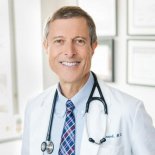There is good news for women aged 45 and over: A new research study shows that women can get prompt relief from the most severe and troubling menopause symptoms without drugs.
As many as 80% of postmenopausal women suffer from hot flashes. Heat wells up from the chest, causing flushing, sweating, and chills. At night, hot flashes interfere with sleep. Estrogen-based medications were once routinely used to treat hot flashes but have been shown to increase the risk of breast cancer and other serious problems. Isoflavone extracts from soybeans work only modestly, leaving women and their doctors with few effective options.
A new study, published by the North American Menopause Society in the journal Menopause, found a powerful new diet approach that reduces moderate-to-severe hot flashes more than 80%, from nearly five per day to less than one per day. During the 12-week study, nearly 60% of women became totally free of moderate-to-severe hot flashes.
Dr. Neal Barnard is president of the Physicians Committee for Responsible Medicine, an Adjunct Professor at the George Washington University School of Medicine, and a Fellow of the American College of Cardiology. In 2016, he founded Barnard Medical Center in Washington, D.C., to create a new model that integrates nutrition into conventional medical care. His federally funded diabetes research revolutionized the nutritional approaches to type 2 diabetes. He has written 20 books on nutrition and health.
He joins us today to talk more about this study.
Want better health and nutrition? Now you can get personalized supplement recommendations and custom vitamin packs delivered to your door! Go to PersonaNutrition.com/Roizen and take your free assessment and get 50% off your order today. - sponsor
![]()
Bonus
How Your Diet Affects Your Risk for Cancer
